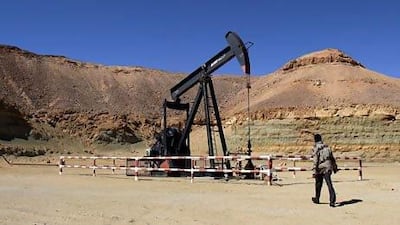Libya should monitor the bank accounts of its top businessmen and government leaders to ensure that they are not benefiting from corruption, said the country's deputy oil minister.
The proposal is the latest from a new government trying to cast aside a legacy of corruption during the regime of Muammar Qaddafi, when hundreds of millions of dollars in kickbacks were allegedly paid to his relatives who held close control over key industries.
"You should have a way to control and follow up any changes in the income of the people in charge," said Omar Shakmak in Dubai this month. "It is not to prohibit for them from being involved in private business or for them to have investments, but we want to make sure this positive change in their wealth, that this comes from the right and legal way."
Reconciliation is a difficult process, admit government leaders. Among proposed laws being considered is one to award monetary compensation to those who were wrongly imprisoned,unfairly fired from their jobs or had property illegally seized during the Qaddafi era.Last month, militiamen laid siege to the home of Ali Zidan, the prime minister, because he had served as an ambassador before defecting in 1980, although there was no evidence tying him to corruption. "We want to make sure that we can arrange or get a clean environment for doing business, because this is the most important issue," said Mr Shakmak. "Mainly in terms of corruption, because this is the biggest damage we have in the country."
Rooting out those with ties to corruption of the past is not that complicated in a small nation with a smaller industry elite, he said.
"We are only 6 million people, so if we come to the leadership of any sector, you are talking about a number of people of sometimes less than 100," said Mr Shakmak, an accountant who last served as chief executive of a National Oil Company subsidiary in London handling hiring and procurement.
"So if any person who's now in the leadership with the previous experience and qualifications and so on, and he was involved in any corruption or killing people, or giving support to the ex-regime against the Libyan people, all the people in the oil sector, they knew him. He will stop being in authority anymore and then he will be investigated, and it will go to the court in accordance with the law."
Libya is targeting pumping 2 million barrels per day, up from the pre-revolution level of 1.7, by 2017 with the help of a government spending plan with tens of billions of dollars to upgrade core oil facilities.
The government also plans to invest in free-trade zones planned before the revolution that would target exports between Europe and Africa, and in training young people for industries other than oil.
"Oil and gas in Libya is not only the main source of funding. It is the sole for the time being," he said.
"So for the long term there are two lines [of investment]: one for the improvement of the oil and gas industry and the other to increase the share of the investment in the other sectors because one day, maybe 30 years time, maybe 50 years, we have no more oil and gas.
"And if we are lucky and we still have some more recoverable reserves, we will have both - we'll have alternative sources of funds and we'll have additional production and income from oil and gas industry."

